The launch of the Insight Paper

The Insight Paper has been developed by The Guild, a network of research-intensive universities in Europe, which has examined how society can harness data and digitalisation to accelerate the green transition, and how the digital transformation and the green transition will mutually influence each other in the years to come. This is considered so crucial by the European Union that they have coined a specific term for this connection: "The Twin Transition."
Professor Morten Dæhlen, the head of dScience - Center for Data and Computational Science at The University of Oslo, has led the work on The Insight Paper.
''Even though the European Green Deal emphasises the importance of digital research and innovation for the green transition of society, the digital transition is still underestimated as a driving force for realising the green transition, e.g. make Europe the first climate-neutral continent within 2050. I hope this report will help change that.'' - Morten Dæhlen.
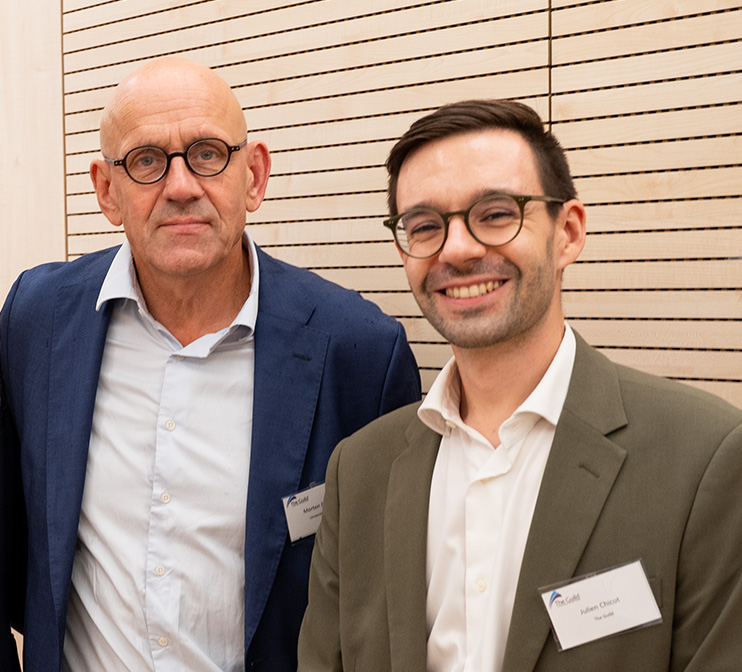
The launch and following discussions were moderated by The Guild’s Acting Secretary-General, Ole Petter Ottersen.
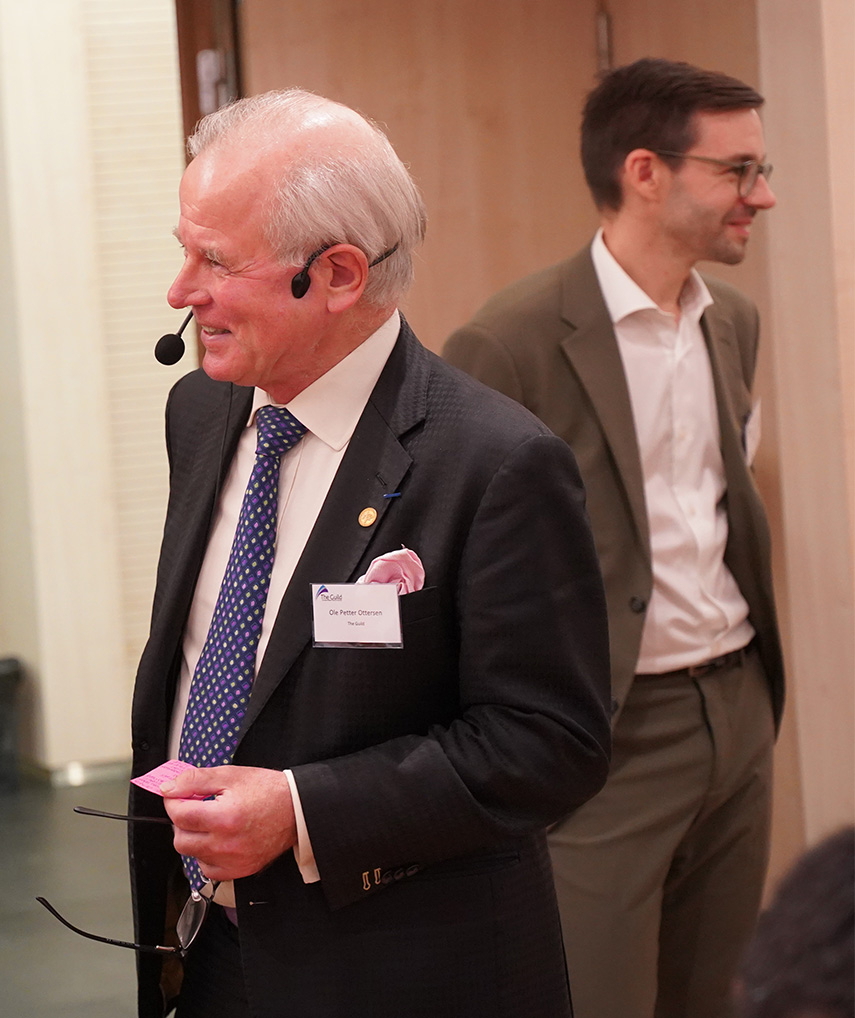
Perfect Timing: The Relevance of This Insight Paper
The first opening address was by Eirik Nestås Mathisen, Minister Counsellor, Mission of Norway to the EU.
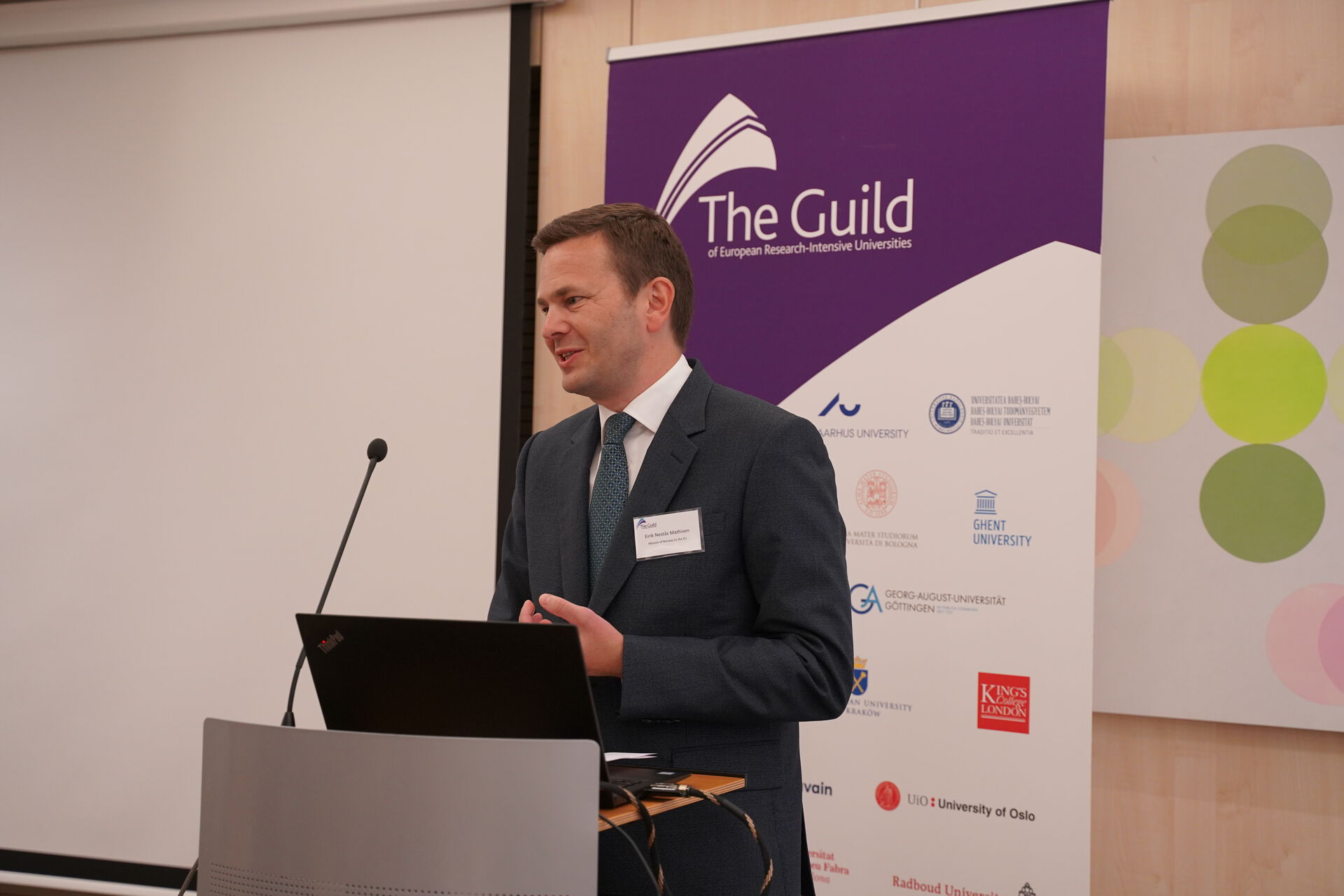
Mathisen argued the importance of the twin transition in Norwegian policy, and Norway’s contribution to advocate, on the European and international stages, for an increased policy attention to the twin transition.
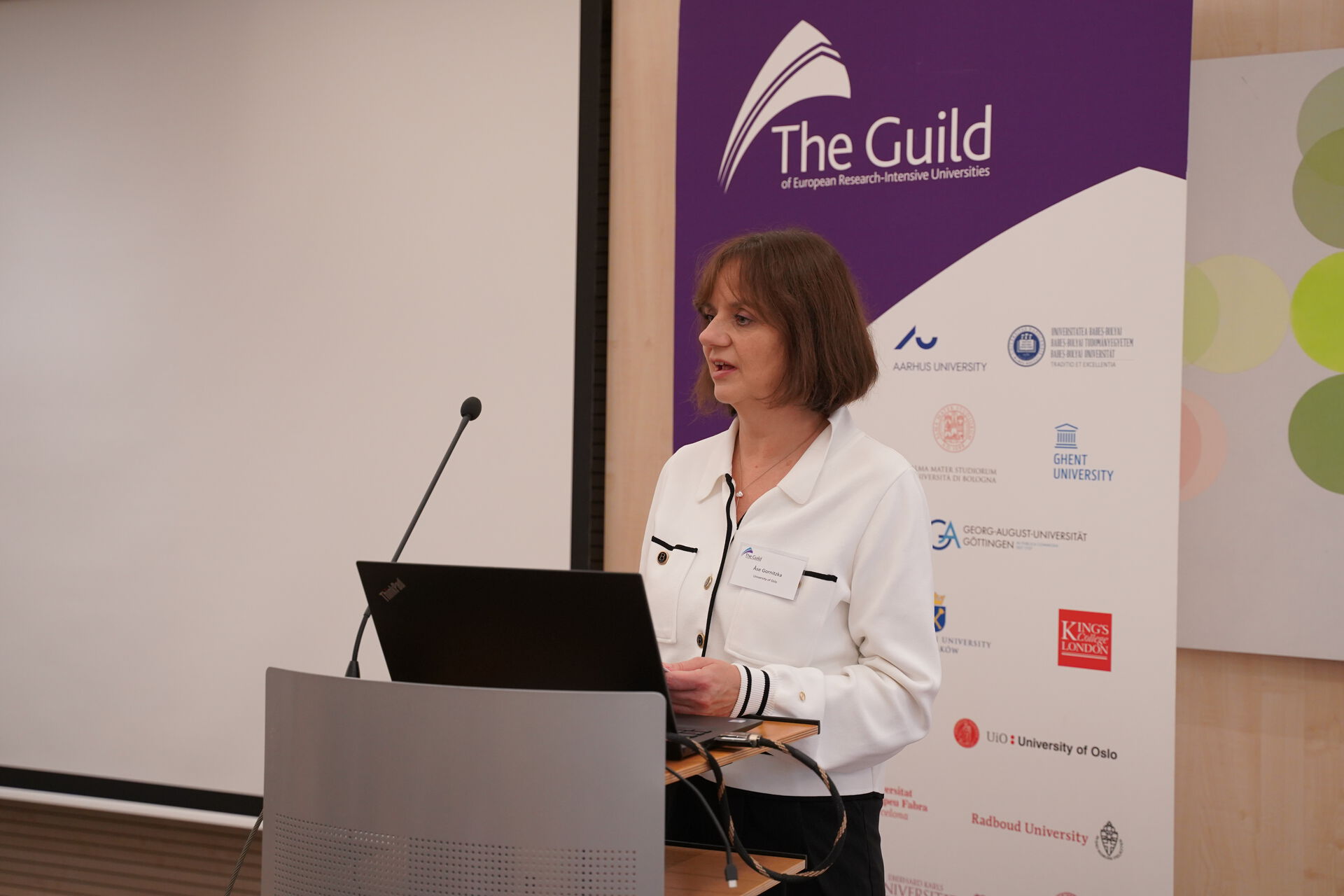
Åse Gornitzka, Pro-Rector, University of Oslo, held the second opening address. Gornitzka emphasised that the Insight Paper's timing couldn't have been more apt, given the current context of escalating climate change, marked by a series of recent disasters in the past weeks and months. She underscored the significance of initiating a discourse regarding the applicability of our research policy and its tools in tackling these pressing challenges.
Gornitzka argued that effective climate-related policies are essential, requiring not only wisdom but also an understanding of how societies navigate crises and manage their way of life, all within a context of shifting paradigms. Interdisciplinary and transdisciplinary research plays a pivotal role in this endeavor, bridging gaps and fostering collaboration between different fields of study. In the long run, it becomes increasingly vital to strike a delicate balance between the exploitation and exploration of resources across various sectors and disciplines. Sustained commitment and attention from our side are imperative to ensure a sustainable future, Gornitzka said.
Presentation of the Insight Paper: “The Twin Transition Century: The role of digital research for a successful green transition of society?”
Morten Dæhlen presented the Insight Paper and explained that a little over a year ago, the working group on digital research and artificial intelligence at The Guild embarked on an extensive exploration of what should constitute Europe's digital research agenda to advance a successful green transition. This research led them to examine their own digital footprint, and it became evident that the climate and nature crisis is a complex challenge that cannot be viewed in isolation. This perspective aligns with The European Green Deal, which aims to steer Europe towards a future of climate neutrality and sustainable economic growth within the bounds of nature's capacity by 2050.
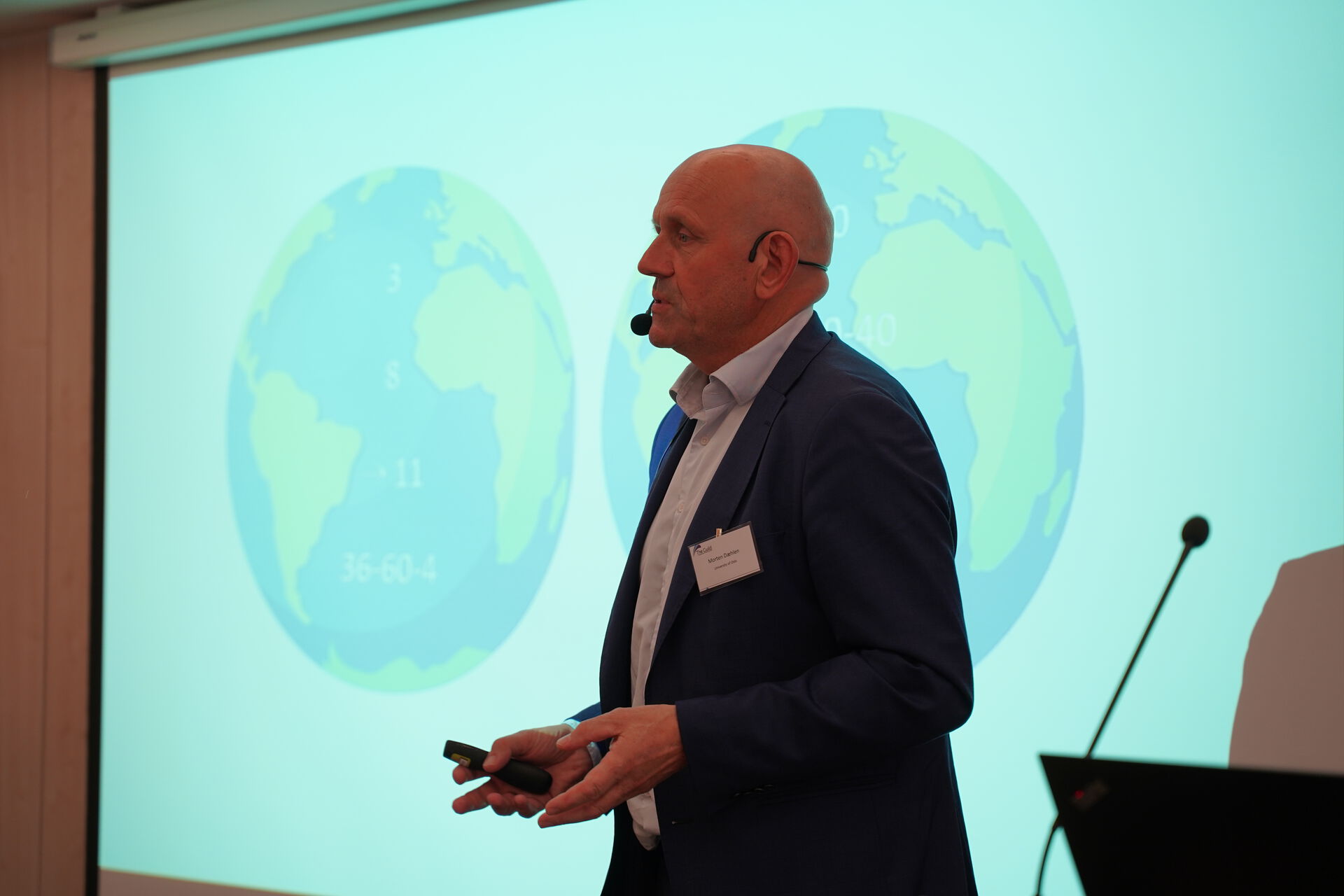
The Insight paper offers clear directions for policymakers, research funders, and higher education institutions to navigate towards a successful twin transition.
"It's not a recommendation for everyone else, but a recommendation for us, so that we can deliver to everyone else," said Dæhlen.
The key takeaways from the Insight Paper are:
1. Recommendations for the higher education sector
- Strengthen efforts to develop digital solutions that enhance institutional sustainability and environmental data handling;
- Foster interdisciplinary collaboration and team-science approaches, including via appropriate career recognition systems;
- Integrate content in educational programmes that empower students to understand and engage with the complexities of both the digital and green transitions.
2. Recommendations for policymakers
- Align policies to create synergies between the digital and green transitions;
- Ensure that the twin transition serves the public good;
- Invest ambitiously in research and innovation to position Europe as a global leader in the twin transition;
- Promote a balanced approach to university research funding for the twin transition;
- Promote long-term fundamental research, both disciplinary and interdisciplinary;
- Facilitate data sharing to ensure that researchers have access to data for research purposes.
3. Recommendations for funders
- Recognise the importance of research, especially fundamental research, across a broad disciplinary spectrum in enabling the twin transition;
- Encourage research on the interplay between environmental sustainability and digitalisation;
- Prioritise impactful, long-term research in EU Missions under Horizon Europe, for example throughout an EU Mission towards 2040 for the development of the future energy system.
In good academic fashion, Morten Dæhlen’s presentation (the main author of the Insight paper), was followed up by comments from The Guild working group members: Marion Thain, King's College London and Michela Milano, The University of Bologna.
Comments from The Guild working group members
Marion Thain from The King's College of London addressed a range of points. She stressed the pressing need for enhanced connectivity across disciplines and the importance of establishing a new knowledge infrastructure to facilitate and support innovative research. Thain emphasised that this transformation was vital for universities to adapt to evolving knowledge paradigms.
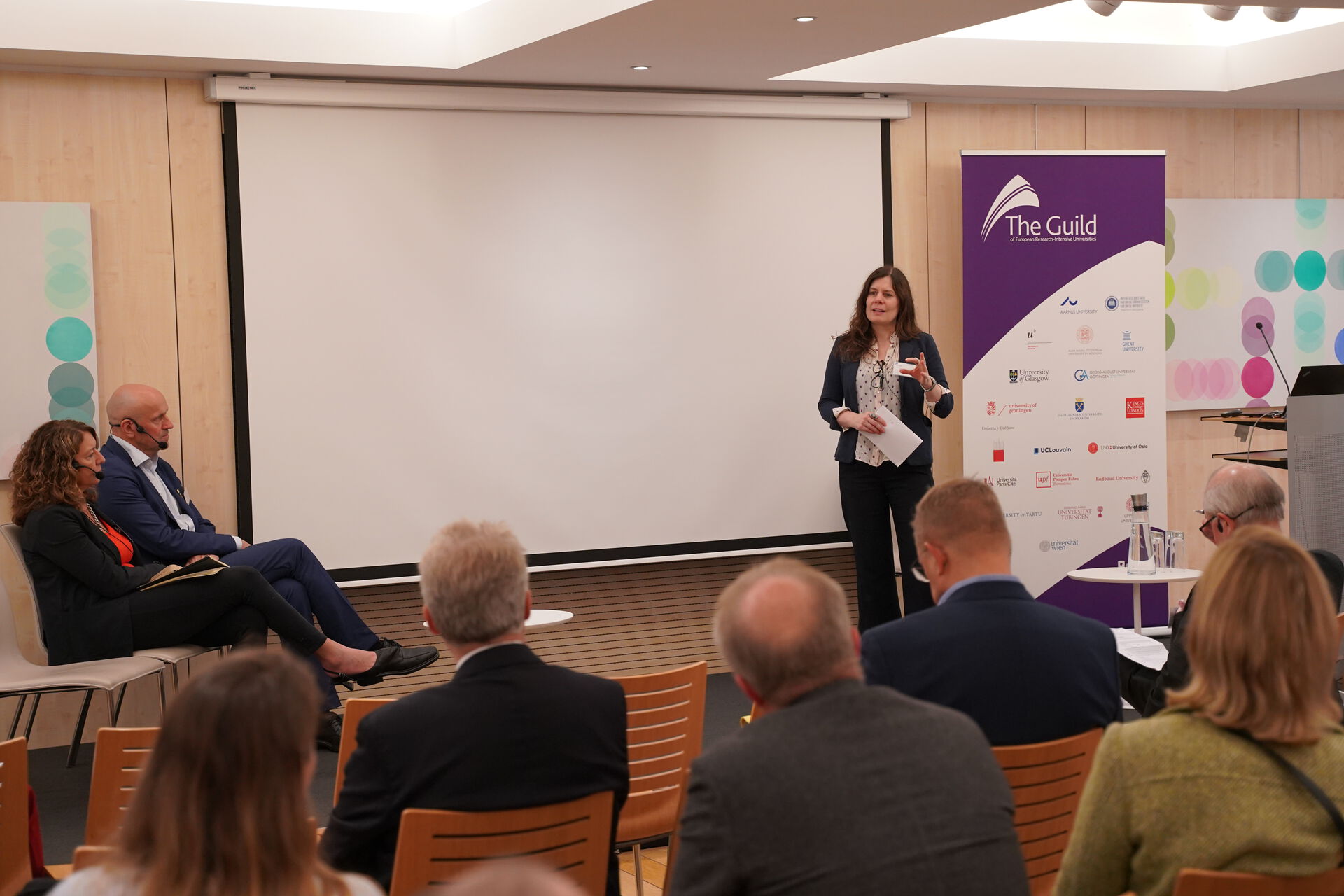
Thain also highlighted the pivotal role of the Social Sciences, Arts, and Humanities (SSAH), often overlooked as a "secret source" in ongoing debates. She called for a shift in perspective, advocating for a more holistic approach to addressing complex technological issues previously deemed intractable.
In the context of the pandemic, she acknowledged the remarkable achievement of scientists in developing vaccines but emphasised the necessity of effective communication with diverse and at times hesitant communities to enable successful vaccine solutions, with the group she mentioned being globally recognised for its leadership.
Thain expressed concerns about a lack of sufficient ethical awareness in research, drawing parallels with the environmental crisis, where despite possessing scientific facts, collective action often fell short.
She reiterated the crucial role of the Social Sciences, Arts, and Humanities, emphasising their immense significance as outlined in the paper. She also highlighted their capacity to convene meaningful conversations across diverse disciplines, creating conceptual spaces that she believed would propel us further on our journey of exploration and discovery.
Michela Milano from The University of Bologna agreed with Marion Thain regarding the importance of including Social Sciences, Arts, and Humanities. She emphasised the necessity of collaboration and cooperation with experts from various fields, highlighting the crucial role of interdisciplinary groups in addressing sustainability challenges effectively.
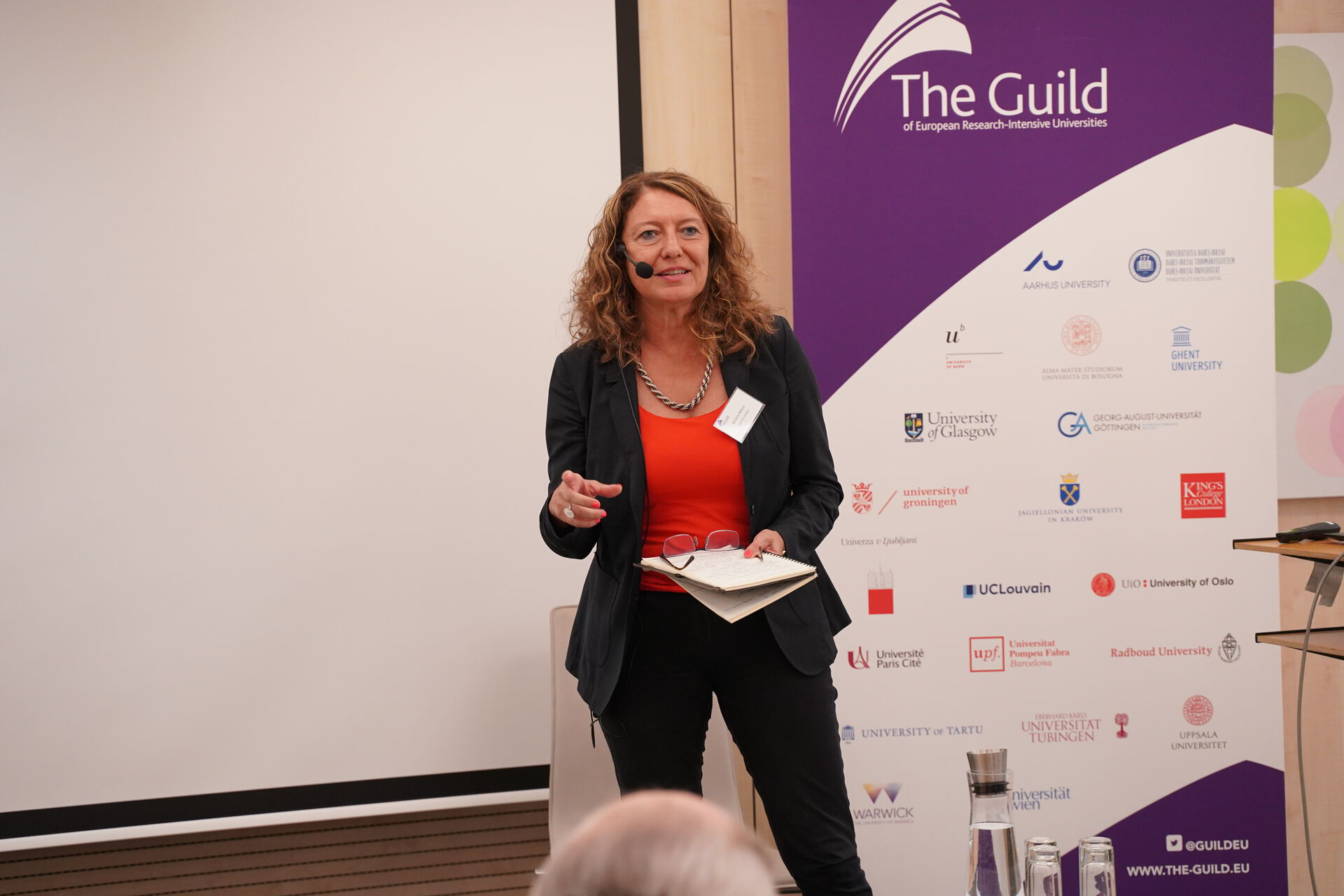
Milano also emphasised the concept of computational sustainability, highlighting the use of computational techniques to address sustainability challenges. She stressed the significant role of AI in creating models that can describe or predict complex systems, ultimately supporting decision-making and providing valuable scenarios for policymakers.
Michela pointed out the challenge of applying these models to social-technical systems, where human behavior can significantly impact outcomes. She acknowledged that the perception of AI's role in supporting policy-makers may not always be favorable but shared her own experience of wanting to assist her region in creating a sustainable energy plan.
Panel discussion
Then it was time for panel discussion with Andrea Ceglia, Policy assistant, DG RTD, European Commission, Marthe Nyssens, Vice-Rector, UCLouvain; Ewa Kocińska-Lange, Director, NCBR Office in Brussels; and Morten Dæhlen.
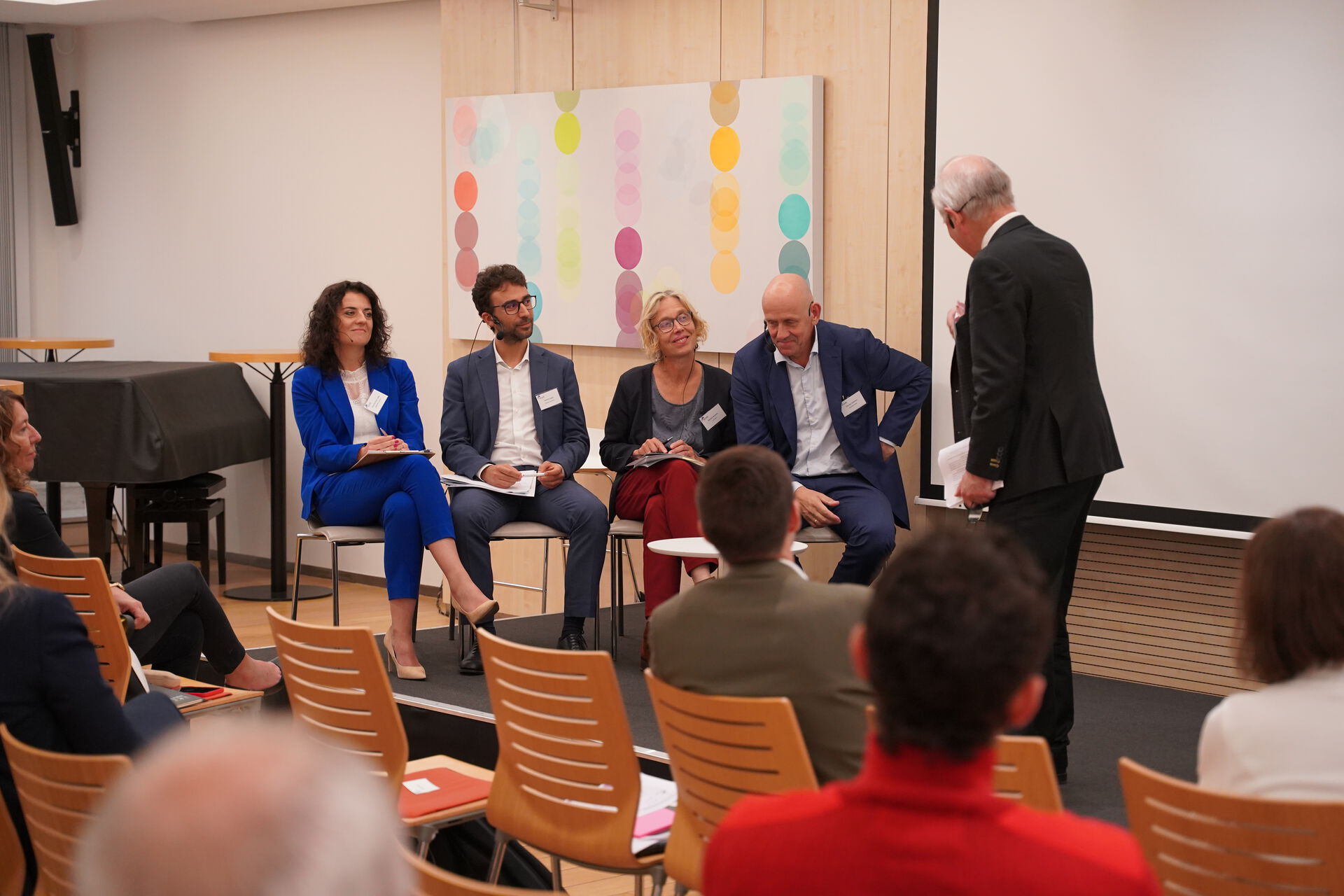
The panel discussion was moderated by The Guild Acting Secretary-General Ole Petter Ottersen that asked the first question to Andrea Ceglia.
“How to make the governance system get more congruent with the twin transition?”
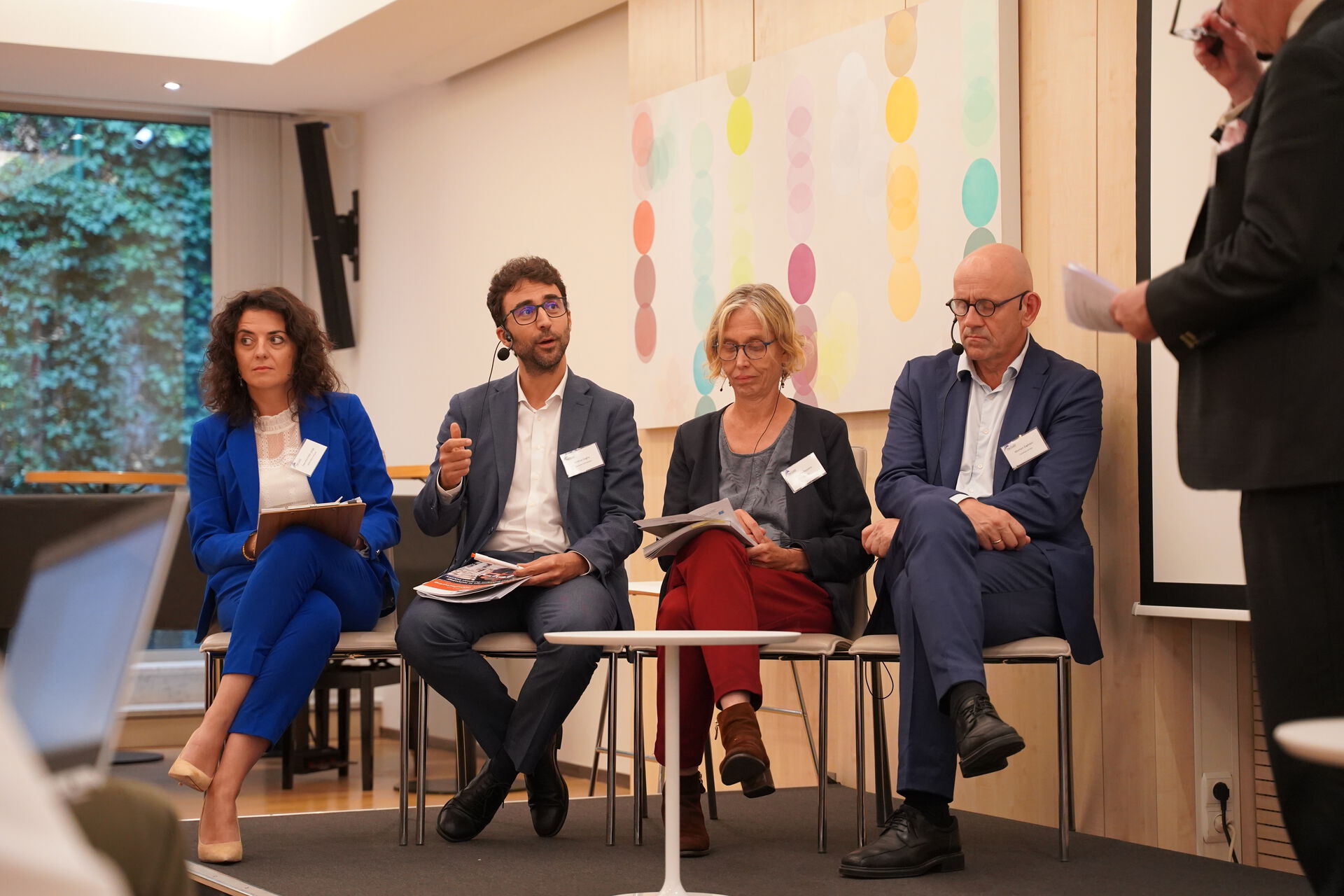
Ceglia responded by emphasising that various ministries in the EU have distinct priorities, underscoring the necessity for improved policy integration. He noted that at the Commission (EC) level, efforts are being made, particularly with The Commission's Directorate-General for Research and Innovation, to adopt an interservice approach in order to define common priorities. He highlighted that this process has involved numerous iterations with different services, allowing for diverse aspects to be thoroughly discussed and considered at the table.
Ottersen directed next question to Marthe Nyssens, Vice-Rector, UCLouvain.
“Universities frequently seek additional funding when developing new strategies. Is it possible for universities to pursue initiatives that are more independent of funding?”
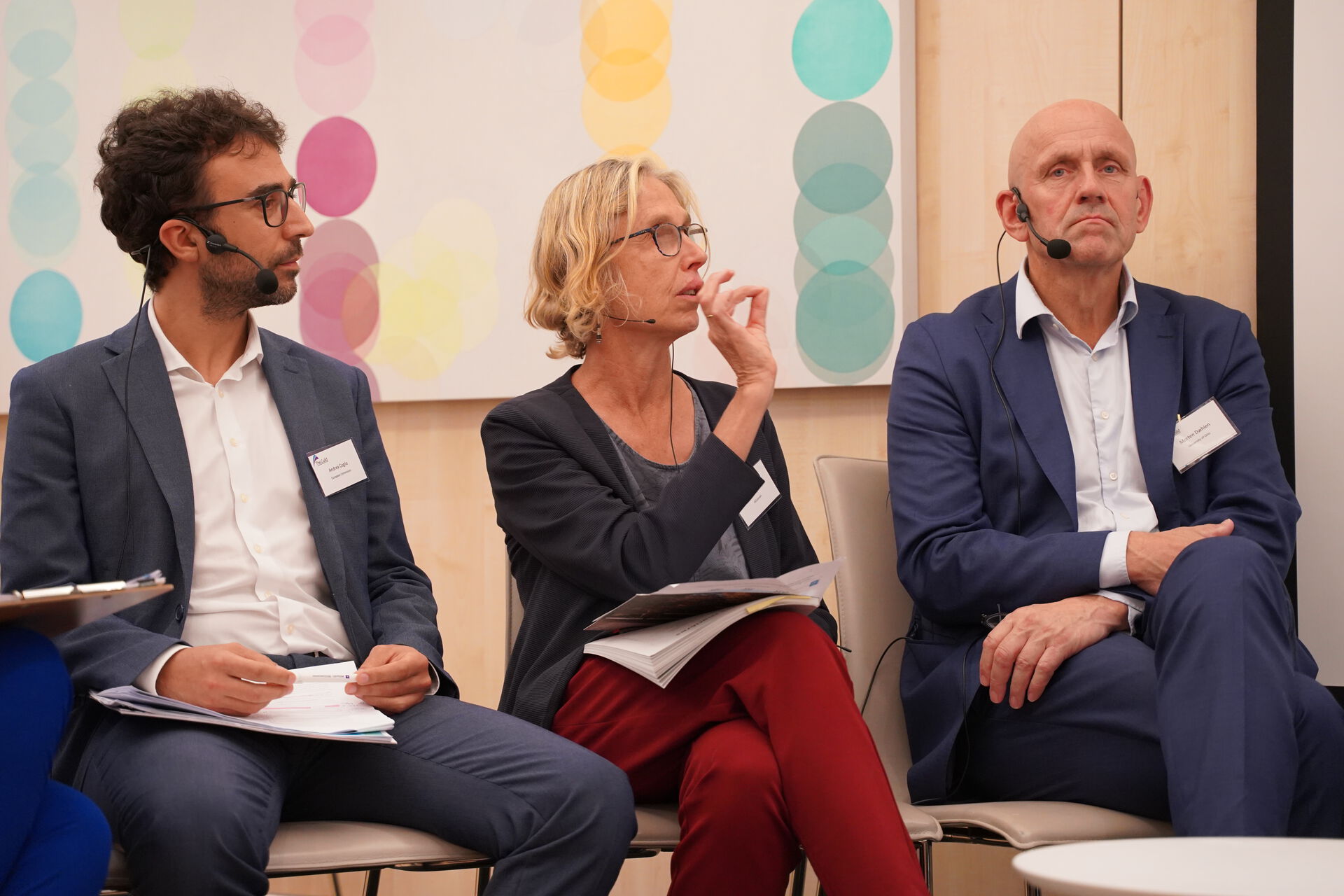
Marthe Nyssens emphasised the significant role universities play in engaging in the debate surrounding the twin transition. She pointed out that while we talk about the twin transition, aligning these two transitions is not straightforward, and the need for articulation is a crucial issue. She highlighted the fundamental difference in the nature of the two transitions – the green transition's aim to stay within planetary boundaries and the rapidly advancing digital transition, which is not inherently integrated into the green transition. Nyssens also mentioned that, in some cases, the digital transition can support ecological efforts, but this is not always evident. She underscored the importance of articulating these differences at the societal level, emphasising that policymakers refer to them as twin transitions.
Ottersen then addressed Ewa Kocińska-Lange, Director of The National Centre for Research and Development (NCBR) in Brussels, with the following question:
“We cannot address the governance issues only at EU level, we need synergies with the national level. We need interdisciplinary research and research that is long term. What is done in Poland when it comes to ensuring that resources are ring fenced to ensure these priorities?”
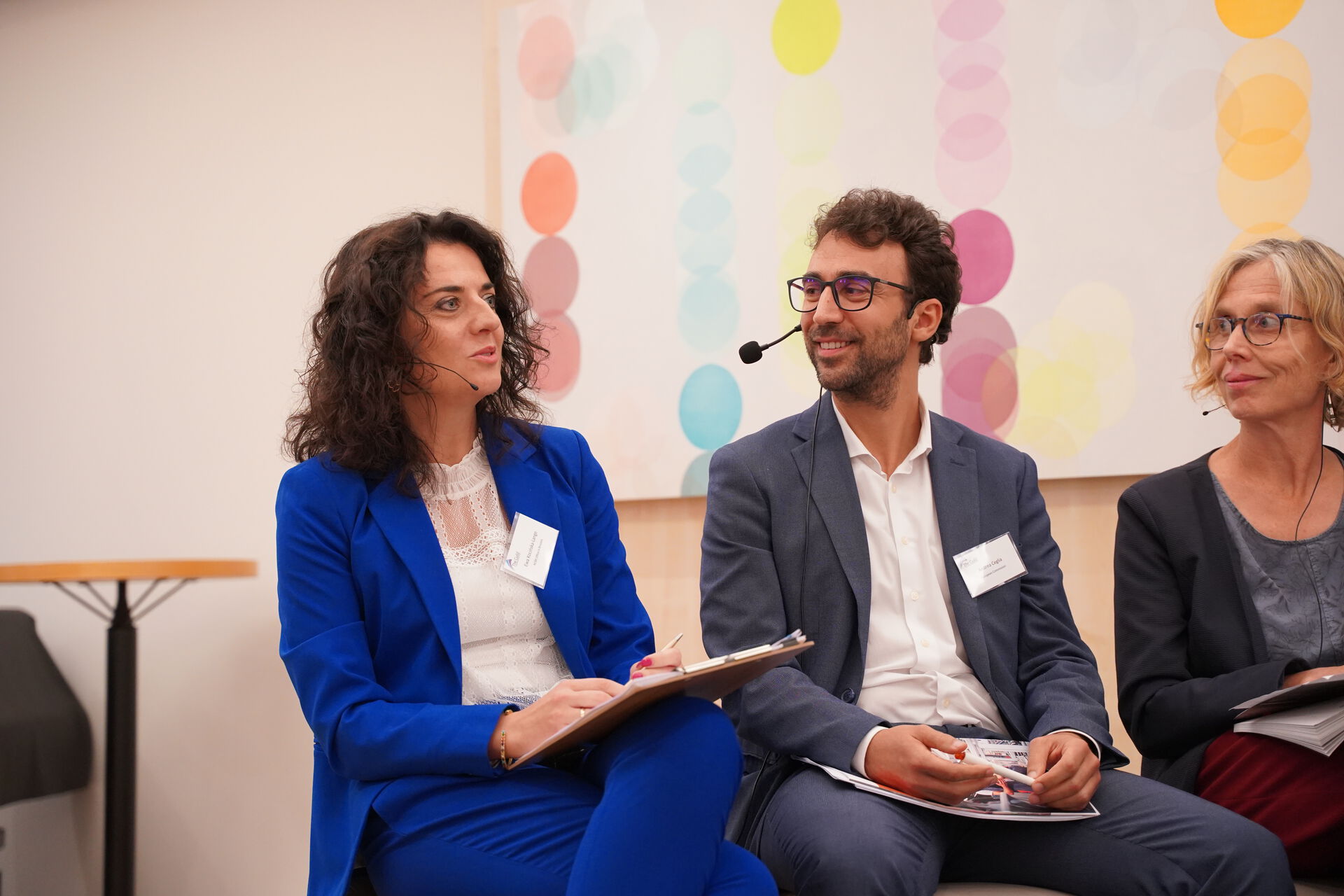
Ewa Kocińska-Lange responded by highlighting the dynamic nature of current developments. She noted that not only her agency but also several other agencies in Poland are actively involved in various Technology Readiness Levels (TRL). Kocińska-Lange emphasised the importance of two key concepts: synergies and interdisciplinarity. She stressed the need for a holistic approach that doesn't solely concentrate on the green and digital aspects. Additionally, she mentioned their engagement in digital twin initiatives and the launch of related calls. She also referenced the context of their work, which aligns with the EU Green Deal and the EU's pursuit of being fit for the digital age.
“Is there one priority that is missing in that discussion? Health? How come you don’t go all the way to say that we should have a transition that includes health?", Ottersen asked the panel.
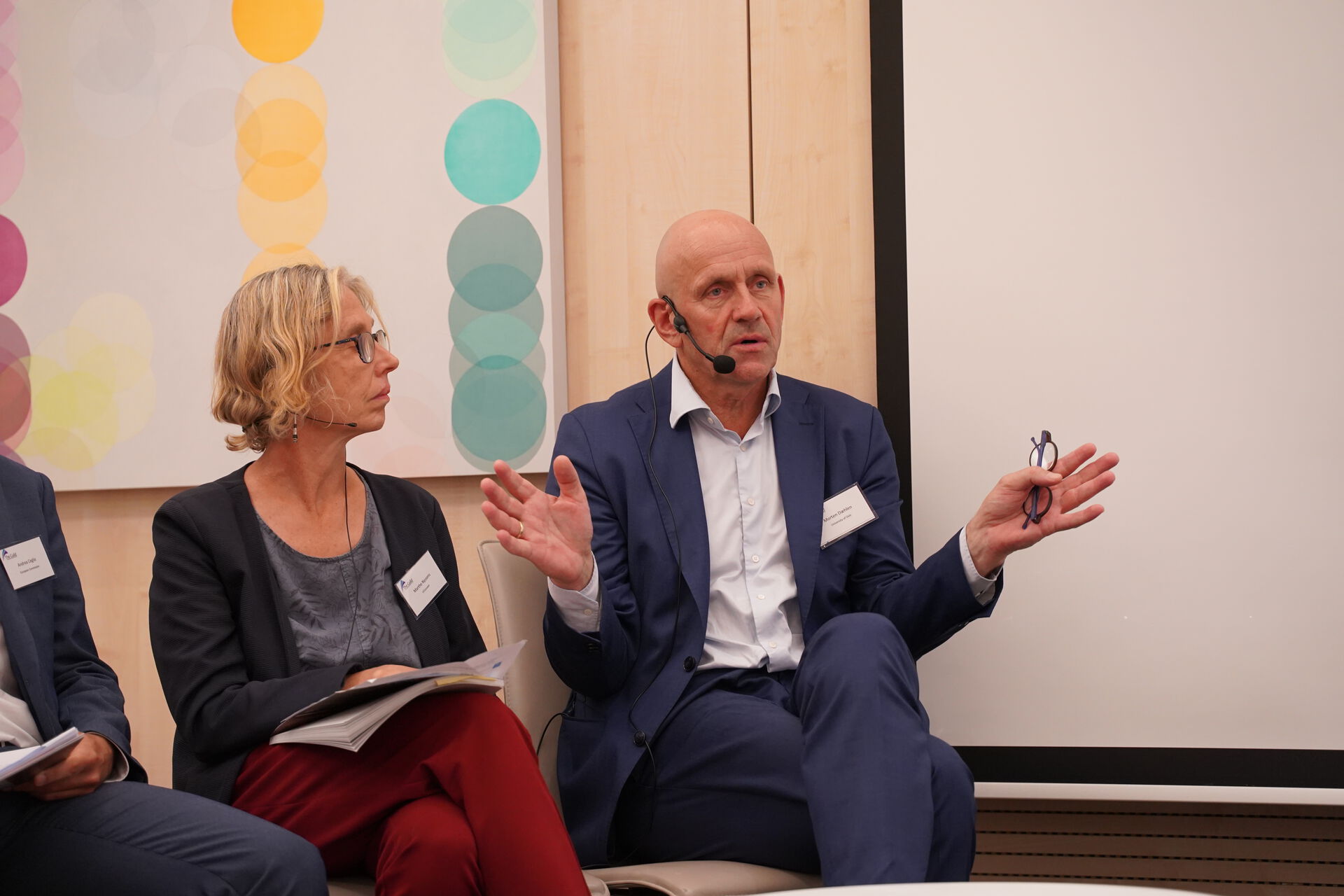 Morten Dæhlen responded by acknowledging that the broader context, including agriculture, transportation, and other sectors, has been discussed. However, he explained that the decision was made to focus exclusively on the green and digital domains. Dæhlen found it intriguing and suggested that an excellent approach could be to extend this line of thinking to the health sector. He expressed awareness of the challenges involved and expressed satisfaction with the recommendations, noting that without them, managing these complexities would be considerably more challenging.
Morten Dæhlen responded by acknowledging that the broader context, including agriculture, transportation, and other sectors, has been discussed. However, he explained that the decision was made to focus exclusively on the green and digital domains. Dæhlen found it intriguing and suggested that an excellent approach could be to extend this line of thinking to the health sector. He expressed awareness of the challenges involved and expressed satisfaction with the recommendations, noting that without them, managing these complexities would be considerably more challenging.
Ottersen followed up.
“Immense complexity, but it adds to the complexity of the policy makers. All data have to be gathered and structured for the governance system. How should we manage that?”
Andrea Ceglia responded by explaining that there is a strategy in place for data, and efforts are being made to decipher and utilise it effectively. He mentioned that this is one component of the strategic actions being undertaken, along with sectoral industrial strategies. Ceglia then discussed ongoing work on a coordinated plan related to digitalisation, with a specific focus on materials. He noted that designing improved products can have a positive impact on climate outcomes. Finally, he highlighted the significant challenge of governance, currently managed through the ERA (European Research Area).
Morten Dæhlen added that the EU Green Deal is of utmost importance at a high-level strategic perspective. The key question is how to efficiently translate this strategy into action. He pointed out the significance of the European Open Science Cloud as a crucial initiative. Dæhlen raised the critical challenge of establishing a governance structure that effectively connects the green and digital domains. While he acknowledged that there isn't a definitive answer yet, he emphasised the importance of recognising the need for such a structure.
Ottersen posed the following question to Ewa Kocińska-Lange: "We must protect our academic freedom, but we find ourselves in a situation where we need to intensify our research efforts. As a significant funder in Poland, how can you reassure us that your aspirations to contribute to climate mitigation will not compromise academic freedom?"
Ewa Kocińska-Lange responded by explaining that they maintain a balance in their programs. While they do have targeted initiatives, they also offer open, bottom-up programs that allow researchers to apply regardless of the specific domain and pursue their research interests. Kocińska-Lange emphasised that their focus isn't solely on green and digital aspects. They also prioritise the development of skills and careers, highlighting the LEADER program as a source of pride, which is open to early career researchers and provides substantial funding opportunities.
“Are we responsible as universities to mitigate the negative effects that stem directly from our own campuses?”, Ottersen asked the panel.
Marthe Nyssens argued the importance of multidisciplinary and transdisciplinary research. She highlighted the need for scientists with diverse backgrounds to collaborate effectively in addressing contemporary challenges. Nyssens also underscored the dual significance of research and education in this context, posing the question of the type of training required for professors to actively contribute to the green transition through education.
Then Ottersen posed one last question to the panel before opening for questions from the room;
“One word noticed: fair transition when we implement the solution for the green transitions, how do we implement the fairness?”
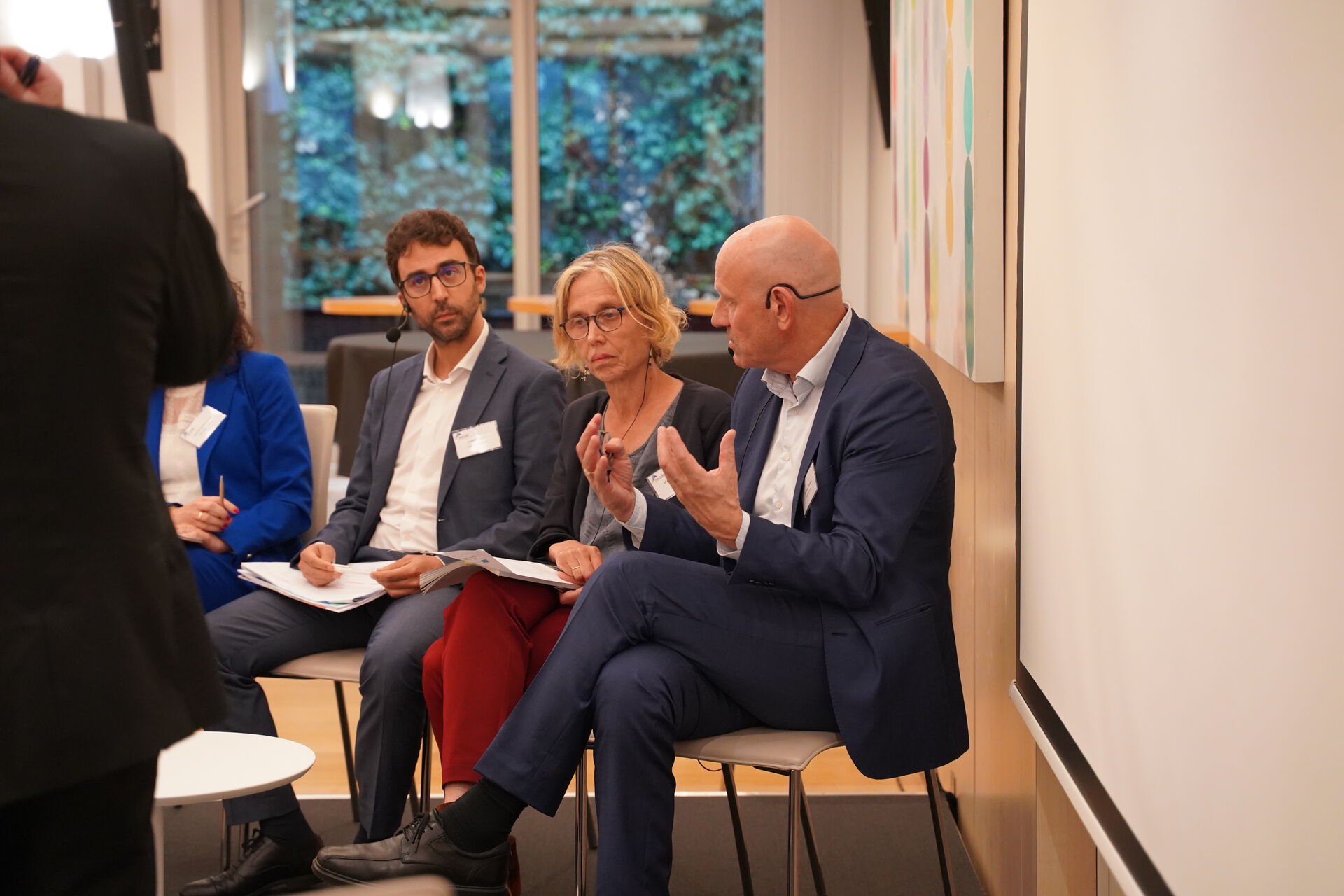 Morten Dæhlen responded by addressing the magnitude of the challenge at hand, stating that the green deal represents by far the largest challenge, one that affects everyone globally. He emphasised the extreme difficulty of this task, highlighting the necessity of collaboration across disciplines and sectors. Dæhlen acknowledged the challenges but stressed the imperative of taking action. He also emphasised the importance of securing funds from funders and garnering support from policymakers to effectively address this challenge. Dæhlen noted several positive developments at the EU level in terms of collaboration and commended The Guild for leading the way, particularly in Africa-related initiatives.
Morten Dæhlen responded by addressing the magnitude of the challenge at hand, stating that the green deal represents by far the largest challenge, one that affects everyone globally. He emphasised the extreme difficulty of this task, highlighting the necessity of collaboration across disciplines and sectors. Dæhlen acknowledged the challenges but stressed the imperative of taking action. He also emphasised the importance of securing funds from funders and garnering support from policymakers to effectively address this challenge. Dæhlen noted several positive developments at the EU level in terms of collaboration and commended The Guild for leading the way, particularly in Africa-related initiatives.
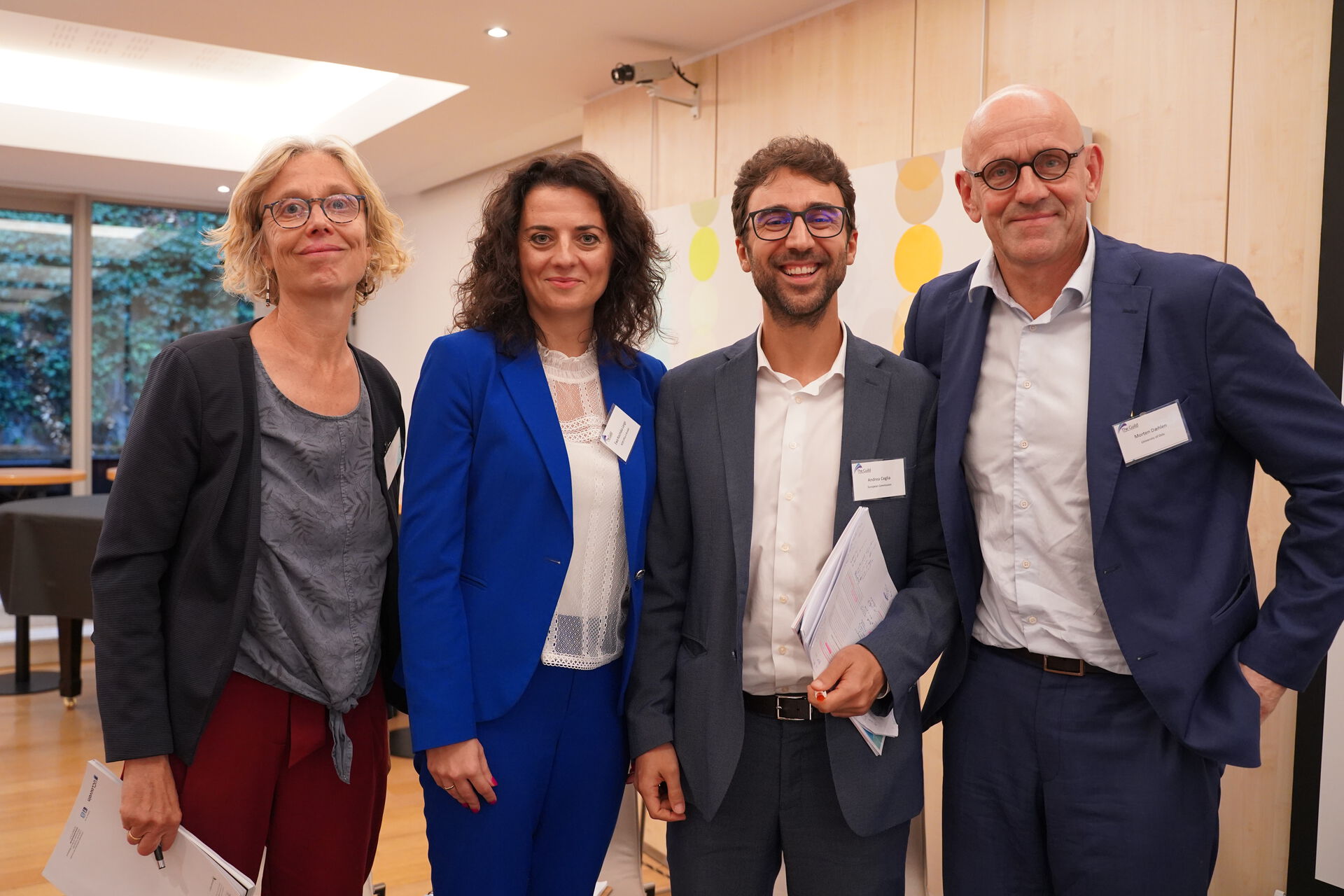
Closing remarks
After the Q&A session The Guild Acting Secretary-General Ole Petter Ottersen made his closing remarks.

Ottersen acknowledged that the challenges posed by climate change and the necessary transitions can sometimes be daunting and disheartening. However, he paid tribute to the importance of basic and fundamental science in addressing these challenges.
He cited an example from the past when the entire field of agriculture faced a crisis, and research, driven by curiosity rather than a specific mission, provided a solution by enabling the harvesting of nitrogen from the atmosphere. Ottersen emphasised that global challenges in the 1980s, including those posed by the private sector, were also effectively addressed through fundamental science.
Looking to the future, he acknowledged that nobody can predict precisely what will happen, but he remained confident that, in the long run, solutions would emerge from the excellence of fundamental science.
